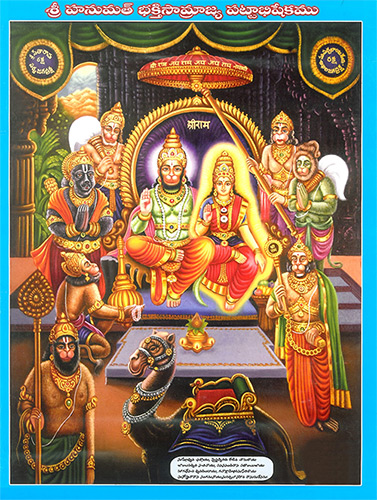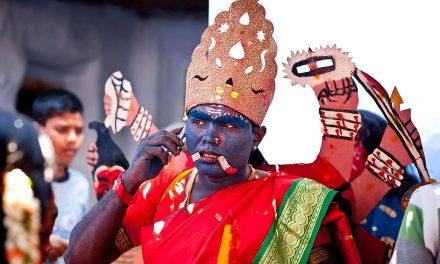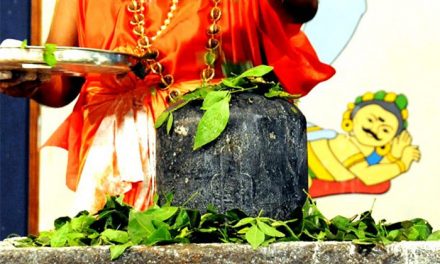
The details of this celestial event are found in the manuscript written by Parasara Maharishi in his book Parasra Samhita. Sri Parasara Maharishi had written the life history of Lord Hanuman from his birth and goes on to depict his life even after the Ramayana.
According to Parasara Maharishi, Hanuman had worshipped Surya Bhagwan (the Sun god) as his Guru and studied the Vedas and mastered the Nine Vyakarnas. Being an Aajanma Brahmachari, Lord Hanuman was not eligible to study the Nava Vyakarnas (nine grammers) for which the status of being a grihastha (married man) was essential.
In order to facilitate the completion of his education, the Trimurtis approached Surya Bhagavan and created a beautiful Kanya, Suvarchala Devi, an Aajanma Brahmacharini, from the Sun’s Kiranas (rays) and arranged a marriage with Hanumanji to make him a Grihastha without Brahmacharya being affected. Whereby he learnt and became a genius in the nine vyakaranas (sanskrit grammar). These details can be found in Parasara Samhita.
There is also a sloka called ‘Hanuman Mangalashtakam’ depicts the Lord thus and runs as follows:
suvarchalaa kalathraaya chaturbhuja dharaaya cha
ushtraa roodhaya veeraya mangalam sri hanumathe
The meaning of the above sloka is: “Salutations to Lord Hanuman, having four arms, accompanied by His consort Suvarchala Devi, seated on a camel and exhibiting extraordinary valour.”
The text further describes Suvarchala as the daughter of Sun-God, Surya, from whom Anjaneya learnt the Vedas.
At the temple at Thailavaram, the moolavar is eight feet tall. The Lord holds the customary mace in his hand that he rests on his right shoulder. His left hand is placed on his hip. The utsava moorthi of Anjaneya is with his consort Suvarchala Devi. The Lord is depicted with four arms and is descriptively called Suvarchala Devi Sametha Chaturbhuja.














in ramanyana described hanuman as brahmachari , he did not take oath like bhisma , the for and against topics regarding brahmachari sabhd in ramayana , ramanyanam ends without saying future of hanuman regarding marriage, rishis in puranas descirbed marraige of hanuman , during ramayana time hanuman was brahmachari , later age he got married as per some puranas , we assume both are true , any how i love and pray hanuman to see/bless all people in this world
This is news to me. Normally we say while doing Suryanarayana Puja, “Chaya Samgya Suvarchalamba Sametha Sri Suryanarayana Swamine Namaha.
This legend is new to me. Gained further knowledged. Many many thanks.
Good Information
This is news to me Always heard Hanuman being bachelor.
This is new information to me.
I am very happy to learn that Lord Hanuman married (with out affecting His ‘Brahmacharjya’) to complete His learning (for which to become ‘gruhastha’ was necessary). I will be happy to have a copy of the writing of Parashar Maharshi.
Thanks for sharing it.. But what “learning grammar” has to do with one’s Meriterial Status?
good information.Thank you.
This is a news to me. This is like Like Lord Ganesha being called Sidhhi Budhhi Vinayaka, where Sidhhi and Budhhi are treated as consorts to the Lord.
Good Information….
A new information,many may not know
This is a rare information about Lord Hanuman.
This is a rare information about Lord Hanuman….
Thanks for your valuable information…………
Then what about siddhi n buddhi???
Why is it necessary to be married to learn the grammar? Could you please elaborate on it? And how could one remain grahast without loosing brahmacharya?
nothing astonishing about this because all the Gods and Devatas associated with Their femal espect of inner Shakti and within ouselves as well. Like Krishna with Radha and Siva with Parvathi Devi etc…
Why is it necessary to be married to learn the grammar? Could you please elaborate on it? And how could one remain grahast without loosing brahmacharya?
I hope my queries are not disrespectful and I apologise if the questions are not appropriate.
I have found a reference to your article of marriage of Hanuman, and reference to a temple called THAILAVARAM, where is it ? Tamil Nadu, where, which part, direction location, is needed. What’s so special of this temple, for what cures or wishes is this temple famous for ?
Ramesh Kumar
Besides, need info on KARTHA VIRYA ARJUNA, FULL
Can we have the verse from Parasara Samhita? additionally is this Parasara Samhita the same book which Ramanujacarya took the definition of Bhagavan ?
Sirs,
As per the Balitha suktham, Vaayu bhagawan took three avatars of which the first being Lord Hanuman ( a true bhaktha of Lord Raama) and the second being Sri Bheemasena ( a true Bhaktha of Sri Krishna- Lord Raama and Lord Sri Krishna are the same with different names in different avataars). Lord Hanuman is not a human being and he is one of the super citizen in the dynasty of Kapi Rajya , wherein the Kapis (monkey faced speaking Vaanara Jaathi) can fly branch to branch in a tree and trees to trees and further. The said Vaanara Jaathi has extinguished now. Only the monkeys are now sustained.
Sirs,
As per the Balitha suktham, Vaayu bhagawan took three avatars of which the first being Lord Hanuman ( a true bhaktha of Lord Raama) and the second being Sri Bheemasena ( a true Bhaktha of Sri Krishna- Lord Raama and Lord Sri Krishna are the same with different names in different avataars). Lord Hanuman is not a human being and he is one of the super citizen in the dynasty of Kapi Rajya , wherein the Kapis (monkey faced speaking Vaanara Jaathi) can fly branch to branch in a tree and trees to trees and further. The said Vaanara Jaathi has extinguished now. Only the monkeys are now sustained..
the Information given is incorrect as Hanumanth the meaning of this he is knowlegable…. and he is next bramha or Bhavi bramha.. he is ruju ganasth.. means they have inherant knowlege or gnana . they dont persue vidya from others…shri hanumanth is prathama avatar of shri vayudevaru. in which he is poorna bramhachari, in second avatar as bhimsen… he is grahasth and in his third avatar . shri Madhwacharya or anand teerth bhagawatpad. he is sanyasi.
this is to complete the work of Shri vishnu… who is almighty of the universe.
the narration is completely bereft of any logic…….. This is what harms our temper for vedic science…….
The information is good. However, I think the reason for getting married to learn 9 grammers should have been elaborated as to why it was necessary to get married?
New information to me.
“asht sidhi nau nidhi ke data” Lord Hanuman has all blessings of Mother Sita. However your information appears to be good as it might have been token transformation.
THANKS GIVE INFORMATION
Sir
I m always enlightened to read different articles on our Gods & various temples. Please, along with articles give detail addresses of temples & places, such that they can be visited. many times only brief location of name of Town is given , which is an insufficient location. Thanx. Jai Shree Ram
The words in the hymns of Maharshi Parasher could be metaphorical depicting the lord’s qualities and mastery over the subjects he studied and need not be literal.The hymns and the words need further analysis in my opinion to distinguish the facts from fantasy. Belief in fantasies will ruin the Sanatan Dharma whose foundations are based on the knowledge and scientific values enshrined in the Vedas as upheld by many ancient, medieval and modern scholars.
The Moon ( Chandra) is said to be married to 28 stars in ancient texts. This metaphorical and symbolizes the passage of moon through the 12 constellations consisting of these stars and not a literal marriage.
Similarly, lord Hanuman’s marriage mentioned in the hymns of Maharshi Parashar could be metaphorical.
Happy knowing it